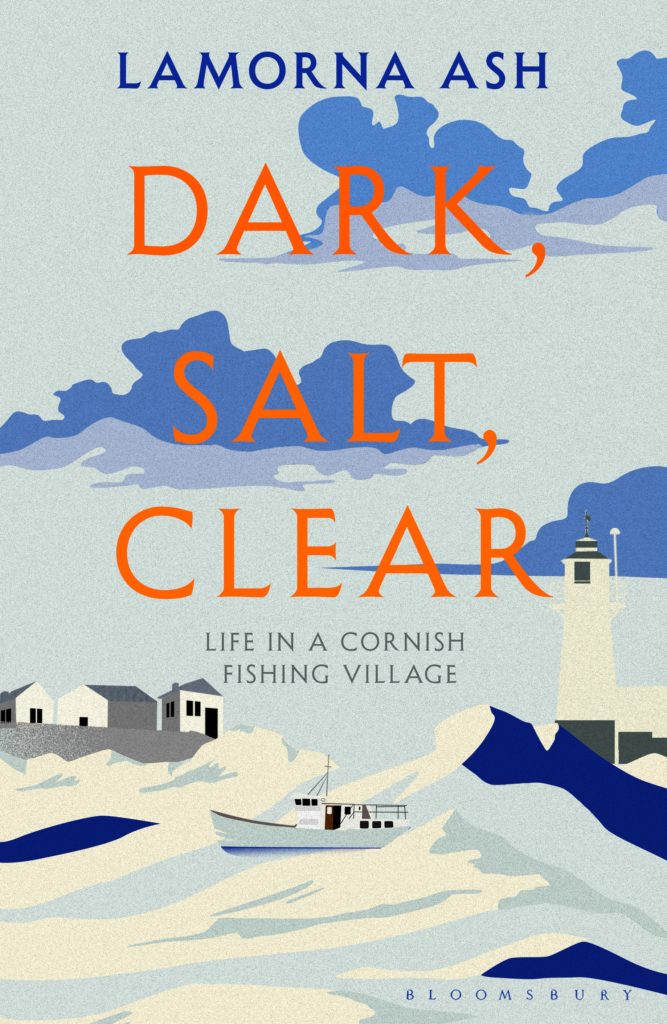Jennifer Edgecombe reviews Lamorna Ash’s ‘Dark, Salt, Clear: Life in a Cornish Fishing Village’, recently published by Bloomsbury.

The Glossary of Cornish Sea-words by Robert Morton Nance was published posthumously in 1963. Nance, an authority on the Cornish language, had been working to preserve the dialect of the local fishing industries by recording ‘the old words and ways at sea as they remembered them’. Lamorna Ash follows in Nance’s footsteps. She lodges in Newlyn – the heart of Cornwall’s fishing industry – and, armed with Dictaphone and laptop, joins up as a volunteer crew member. By going out to sea with the local fishermen, she hopes to ‘experience how other people live, not just hear about it and infer’.
She shares with Nance – who was born to Cornish parents in Cardiff before settling in St Ives – this connection with West Penwith. The area is deep-rooted within Ash’s lineage, with successive generations on her mother’s side hailing from Lelant (‘I ended up in Cornwall because it was my mother’s land’). Ash herself grew up in London, but her heritage is there in her ‘distinctly Cornish name’ – “Lamorna” is a cove just west of Newlyn. On returning after holidays in Cornwall, she ‘would feel the absence of that ancestral land’ – a breaching that she feels compelled to explore in Dark, Salt, Clear.
It is this same deep connection to a place that she recognises within the Newlyn community – ‘this whole village whose gaze centres upon the harbour’. The ‘weather-beaten’ fishermen that she interviews, or works alongside, each express a deeply felt relationship to the Cornish landscape. They bear the scars of the sea on their bodies – ‘the mark of a life lived hard’ – that ‘mark them out as men of the sea’; tattoos resembling ‘bruise-coloured islands’ or yellowed fingers, stained through the repeated rolling of cigarettes ‘to break up the monotony of the watch’.
Even without his ‘fish and blood-smeared oilskins’, gill-netter Simon says that ‘people know exactly who and what you are’. Ash discovers through listening to the local ‘yarns’ (‘tales about their time at sea’) that it was the pull of the sea that lured them into fishing from a young age. These ‘Cornish men born of salt’ would hang around the harbour as schoolboys, until the day they got the chance to ‘go upon the water’ (a Cornish phrase recorded by Nance when talking to a St Ives fisherman: ‘I do b’long to go ‘pon the water’.) Ash learns that even on the school bus, Don resembled his adult life as a Skipper:
Don would never sit with the other children. He would stand at the front watching the road, chatting to the driver, and always with a packet of crisps stuffed in each pocket from which he would take alternate handfuls.
Don appears later, standing at the head of the trawler Filadelfia, staring out to sea with an unmoving gaze. His steeliness mirrors the Newlyn Fisherman Memorial. Facing the water, a ‘10-foot high bronze and granite’ statue commemorates those ‘lost to the sea since 1980 – over twenty in all’. This number continues to rise and losses of all kinds are prevalent in Dark, Salt, Clear – lost seamen, financial strains and failed catches are common occurrences. There is a grim determinism to survive. Ash is told, ‘You gotta be tough as boots’. She hears about the fisherman who ‘hung himself the day we set out’. There is a sense of existentialism among the fleet – one crew member tells her that he does not sleep after a long night spent at sea – ‘because then you would be a ghost’.
In the infamous Swordfish pub ‘cheery photographs of departed fishermen’ adorn the walls, they are the ‘heroes of the village’ and yet they are being priced out of their homes due to gentrification (there are no longer any ‘rough edges’ in Mousehole). Forced to live outside the town, ‘the connection between the community and the fishing industry [is] becoming thinner, more threadbare’. The struggle to balance their lives at sea with their social and economic demands on shore proves difficult to sustain:
If one of their two worlds collapses, either on land or a sea, that balance is lost, and he is in danger of losing himself.
Re-examining her own conflict, between city and coast, Ash views the memorial’s bronze fisherman with new perspective – he is not depicted heading out to sea, as she first thought, but instead readying to fasten his boat to the harbour: he ‘is not casting out but coming home’ – reattaching himself to the land. It is a strong connection with a land place that has, conversely, kept the fishing industry sustained throughout the centuries. In Dark, Salt Clear, each time Ash returns to Cornwall, there is a similar effect. Not only has she created, for posterity, a vivid and lasting portrait of those that ‘grow out of the land and the sea’ but she also has strengthened her own tether to Cornwall.
*
Dark, Salt, Clear is out now, priced £16.99. In this time of uncertainty, please contact your local independent bookshop and investigate their purchase and delivery options – although closed in person, many of these small businesses are finding innovative ways to take and fulfil orders, and they will be most appreciative of your custom.
You can follow Jennifer on Twitter here.